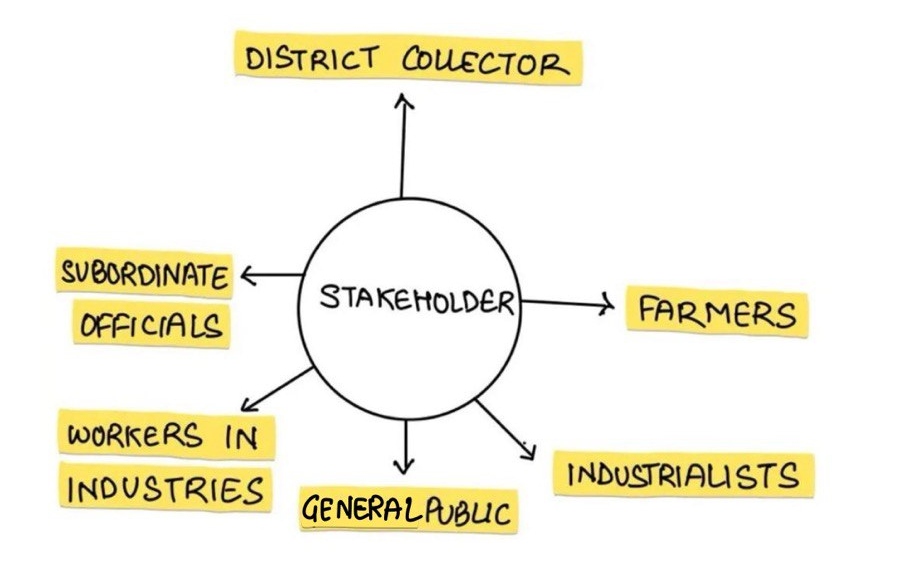With the summer heat being exceptionally severe this year, the district has been facing severe water shortage. The District Collector has been mobilizing his subordinate officials to conserve the remaining water reserves for preventing the district from plunging into acute drinking water crisis.
Along with an awareness campaign for conserving water, strict measures have been taken for stopping the over-exploitation of ground-water. Vigilance teams have been deployed to tour the villages and find the farmers who are drawing water from deep borewells or from the river reservoir for irrigation. The farmers are agitated by such action. A delegation of farmers meets the District Collector with their issues and complains that while they are not being allowed to irrigate their crops, big industries located near the river are drawing huge amounts of water through deep borewells for their industrial processes. The farmers allege that their administration is anti-farmer and corrupt, being bribed by the industry. The district needs to placate the farmers as they are threatening to go on a prolonged protest. At the same time, the District Collector has to deal with the water crisis. The industry cannot be closed as this would result in a large number of workers being unemployed.
(a) Discuss all options available to the District Collector as a District Magistrate.
(b) What suitable actions can be taken in view of mutually compatible interests of the stakeholders?
(c) What are the potential administrative and ethical dilemmas for the District Collector ?
With the summer heat being exceptionally severe this year, the district has been facing severe water shortage. The District Collector has been mobilizing his subordinate officials to conserve the remaining water reserves for preventing the district from plunging into acute drinking water crisis.
Along with an awareness campaign for conserving water, strict measures have been taken for stopping the over-exploitation of ground-water. Vigilance teams have been deployed to tour the villages and find the farmers who are drawing water from deep borewells or from the river reservoir for irrigation. The farmers are agitated by such action. A delegation of farmers meets the District Collector with their issues and complains that while they are not being allowed to irrigate their crops, big industries located near the river are drawing huge amounts of water through deep borewells for their industrial processes. The farmers allege that their administration is anti-farmer and corrupt, being bribed by the industry. The district needs to placate the farmers as they are threatening to go on a prolonged protest. At the same time, the District Collector has to deal with the water crisis. The industry cannot be closed as this would result in a large number of workers being unemployed.
(a) Discuss all options available to the District Collector as a District Magistrate.
(b) What suitable actions can be taken in view of mutually compatible interests of the stakeholders?
(c) What are the potential administrative and ethical dilemmas for the District Collector ?
The central ethical dilemma lies in ensuring equitable distribution of a scarce resource (water) amidst competing demands from farmers, industry, and domestic needs, with allegations of corruption exacerbating the situation.
Stakeholder Identification.
(a) Options available to the District Collector:
-
Option 1: Maintain current restrictions on farmers while allowing industries to function.
Pros Cons Sustains employment Perceived injustice by farmers Industrial output is ensured Escalates farmer unrest -
Option 2: Impose uniform restrictions on both farmers and industries.
Pros Cons Demonstrates fairness May halt industrial activity Upholds equity Job losses -
Option 3: Temporarily suspend industrial water use.
Pros Cons Immediate relief to farmers Economic cost Unemployment risk -
Option 4: Allow limited irrigation to farmers and ration industrial water use.
Pros Cons Balances both needs Needs monitoring Reduces tension Potential misuse
(b) Suitable actions for mutually compatible interests:
-
Participatory Water Management: Establish a participatory water management committee involving representatives from all stakeholder groups. This promotes transparency and ensures that all voices are heard, addressing the social contract theory.
-
Incentivize Water Conservation: Offer incentives to industries and farmers for adopting water-efficient technologies and practices. This aligns private interests with public good by rewarding responsible water use.
-
Diversification of Industries: Encourage industries to diversify into less water-intensive sectors. This promotes long-term economic sustainability and reduces dependence on scarce water resources.
-
Crop Planning and Water-Efficient Agriculture: Promote drought-resistant crops and water-efficient irrigation techniques among farmers. This addresses both the farmers' needs and the need for water conservation, reflecting a utilitarian approach.
-
Public Awareness Campaigns: Launch targeted public awareness campaigns to educate all stakeholders about the importance of water conservation. This fosters a sense of shared responsibility and promotes the common good.
(c) Potential administrative and ethical dilemmas:
-
Equity vs. Efficiency: How to equitably allocate scarce water without harming either farmers or industry.
-
Short-term Utility vs. Long-term Sustainability: Choosing between immediate crop survival vs. ecological conservation.
-
Public Perception vs. Objective Reality: Managing the narrative amid allegations of corruption.
-
Rule of Law vs. Compassion: Enforcing restrictions uniformly while understanding farmer distress.
-
Transparency vs. Confidentiality: Balancing public disclosure and sensitive industry data.
-
Economic Impact vs. Social Justice: Industrial output/employment vs. farmer livelihood and food security.
The District Collector must act as a neutral facilitator, applying ethical principles like justice, transparency, accountability, and empathy. A participatory approach, data-driven decision-making, and equity in enforcement will help manage the crisis while maintaining trust in governance.
Answer Length
Model answers may exceed the word limit for better clarity and depth. Use them as a guide, but always frame your final answer within the exam’s prescribed limit.
In just 60 sec
Evaluate your handwritten answer
- Get detailed feedback
- Model Answer after evaluation
Model Answers by Subject
Crack UPSC with your
Personal AI Mentor
An AI-powered ecosystem to learn, practice, and evaluate with discipline

